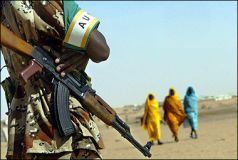AU troops providing armed escorts for displaced Darfur women, girls
NAIROBI, Apr 14, 2005 (IRIN) — African Union (AU) personnel in the western Sudanese state of North Darfur have started providing armed escorts for displaced women and girls to protect them from attacks, an AU official told IRIN on Wednesday.

|
|
Displaced walk in front of a Rwandan soldier in Kab Kabiya, north west of El-Fasher, Sudan. (AFP). |
“The women from Abu Shawk IDP [internally displaced person] camp in North Darfur are escorted by AU soldiers once a week, when they venture outside the camp to collect firewood,” said Justin Thundu, AU’s public information officer at El Fasher, the capital of North Darfur.
Thundu said the AU considered these escorts an integral part of its protection mandate in Darfur. “Beside our daily patrols, it is one of the activities we carry out to promote confidence-building among the IDPs.”
“We haven’t heard of any harassment cases around Abu Shawk over the past weeks,” Thundu added. “It has been a very successful exercise. We are doing it in a few other camps as well”
However, Leslie Lefkow, a researcher for the Africa division of Human Rights Watch (HRW), and co-author of a new briefing paper on sexual violence in Darfur, told IRIN on Tuesday that the AU did not yet have the resources to extend such protection to the rest of the region.
“This is a great interim solution that could be replicated across Darfur, but the AU does not have the capacity to do that at the moment,” she said.
In Lefkow’s report, released on Tuesday, HRW said women and girls who had fled the conflict in Darfur to live in IDP camps were continuing to suffer rape and sexual violence. It called for urgent protection for them.
“Rape and sexual violence have been used to terrorize and uproot rural communities in Darfur,” Peter Takirambudde, HRW Africa director, said in the brief.
The report documented how Sudanese security forces – including police meant to protect IDPs and Janjawid militias allegedly aligned with the government – had continued to commit rape and sexual violence on a daily basis around the camps.
It was not immediately possible to get a comment from the Sudanese government.
According to Tuesday’s report, even women and girls in Chad, who had fled the violence in Darfur, continued to face the risk of rape and assault by civilians or militiamen when collecting water, fuel or animal fodder near the border.
HRW said that as of February, only one of the six agencies that were providing health services in refugee camps in Chad had a protocol for rape which included the provision of emergency contraception, comprehensive treatment of sexually transmitted diseases and post-exposure prophylaxis for HIV.
“Donors urgently need to set up programmes to protect women and girls – and address the needs of those who have been raped,” Takirambudde added, referring to the international donor conference on Sudan, which took place on Monday and Tuesday in Oslo, Norway.
The Oslo conference raised 4.5bn dollars billion for the reconstruction of Sudan, exceeding an initial target of 2.6bn dollars.
In its report, HRW urged donors and humanitarian agencies to respond to the medical, psychological, social and economic consequences of sexual violence in the Darfur conflict.
Entitled “Sexual violence and its consequences among displaced persons in Darfur and Chad”, the report was based on personal accounts collected during a number of mission to the region over the past 14 months.
“I can’t put an exact number to it, but we collected at least 300 testimonies, if not 400 or 500,” Lefkow told IRIN. “Dozens and dozens of them involved sexual violence.”
HRW documented scores of cases, as recently as last month, of women being raped while travelling along rural roads in Darfur.
Despite the existence of international standards for responding to sexual and gender-based violence, the report suggested that humanitarian agencies were not implementing these guidelines on a systematic basis in Darfur and Chad.
The war in Darfur pits Sudanese government troops and militias, allegedly allied to the government, against rebels fighting to end what they have called marginalization and discrimination of the region’s inhabitants by the state. Over 2.4 million people have been affected by the conflict, 1.85 million of whom are internally displaced or have been forced to flee to neighbouring Chad.
